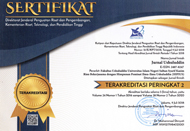Examining the Intersection of Prophetic Hadith and Intellect: Authenticity, Contradiction, and Scholarly Perspectives
Abstract
Keywords
Full Text:
PDFReferences
al-Aḥdab, K. M. (2006). Athru ʻilm al-ḥadīth fī tashkīl al-ʻaql. Jadah: Muʻjam al-fiqh al-Islāmī.
al-ʻAsqalānī, A. i. (2000). Nuzhat al-naẓar fī Tawḍīḥ nukhbah al-Fikr fī muṣṭalaḥ ahl al-athar. Dimashq: Maṭbaʻat al-Ṣabāḥ, .
al-Bayhaqī, A. B.-Ḥ. (2003). Sunan al-Kubrá. Birotte: Dār al-Kutub al-ʻIlmīyah.
al-Bukhārī, A. A. (1311 h). Ṣaḥīḥ al-Bukhārī. Egypt: Maṭbaʻat al-Kubrá al-Amīrīyah.
al-Dawsarī, A. i. (2023, February 6). Asālīb al-ḥadāthīyīn fī al-ṭaʻn fī al-Sunnah al-Nabawīyah. Retrieved from alukah.net: https://www.alukah.net/culture/0/156205/%D8%A3%D8%B3%D8%A7%D9%84%D9%8A%D8%A8-%22%D8%A7%D9%84%D8%AD%D8%AF%D8%A7%D8%AB%D9%8A%D9%8A%D9%86%22-%D9%81%D9%8A-%D8%A7%D9%84%D8%B7%D8%B9%D9%86-%D9%81%D9%8A-%22%D8%A7%D9%84%D8%B3%D9%86%D8%A9-%D8%A7%D9%84%D9%86%D8%A8%D
al-Ghazālī, A. Ḥ. (1975). Maʻārij al-Quds fī Madārij maʻrifat Al-nafs. Birotte: Dār al-Āfāq al-Jadīdah.
Al-Ḥusaynī, A. i. (n.d.). Al-Kullīyāt. Birotte : Muʼassasat al-Risālah.
ʻAlī, S. I. (1987). Baḥwthu fī al-Tarbiyah al-Islāmīyah. Kairo: Markaz al-tanmiyah al-basharīyah wa-al-Maʻlūmāt.
Al-Jawzi, A. I. (1966). Al-Mawḍūʻāt. Birott : Dār al-Kutub al-ʻIlmīyah.
al-Jawzīyah, A. ʻ. (2001). Al-Ṣawāʻiq al-mursalah. Kairo: Dār al-ḥadīth.
Al-Juwaynī, A. I. (1432 h). Durūs li-Abī Isḥāq al-Juwaynī. Maktabat al-shāmilah.
al-Khaṭīb, R. (2017, January 2). Shubhat mukhālafat al-naṣṣ lil-ʻaql. Retrieved from Al-Jazirah: https://www.aljazeera.net/blogs/2017/1/2/%D8%B4%D8%A8%D9%87%D8%A9-%D9%85%D8%AE%D8%A7%D9%84%D9%81%D8%A9-%D8%A7%D9%84%D9%86%D8%B5-%D9%84%D9%84%D8%B9%D9%82%D9%84
Alṭyālysy, A. D. (1999). Musnad Abī Dāwūd. Egypt: Dār al-Hijrah.
Baharuddin, &. S. (2014). (2014). Maqasid al-Shariah as a complementary framework to conventional bioethics. Science and engineering ethics, 317-327.
Crow, K. (2018). The intellect Islamic thought: Mind and hear. KATHA-The Official Journal of the Centre for Civilisational Dialogue,, 1-22.
Farida, U. (2021). Muḥammad Nāṣir al-Dīn al-Albānī wa-manhajuhu fī taṣḥīḥ al-ḥadīth wtḍʻyfh. Jurnal Studi Ilmu-ilmu Al-Qur'an dan Hadis, 411-430.
Geramopour, M. &. (2020). The Role of Intellect in Understanding Shariah and Legislation. Jurisprudence the Essentials of the Islamic Law, 313-332.
Gonibala, R. A. (2019). Manajemen Akal Dan Orientasi Studi Al-Quran Dan Al- Ḥadīth . Jurnal Al Himayah, 283-294.
Husain, S. M. (2019). Daf‘Al-Mu‘āriz Al-‘quli Fi Al-Sunat Al-Nabawiah. Journal Usuluddin Wa Al Da‘wah, 419-501.
IbnFāris, A. a.-Ḥ. (1979). Maʻājim Mqāys Al-lughah. Birotte: Dār al-Fikr.
Ibn-Taymīyah, T. a.-D.-ʻ.-Ḥ.-S.-Q. (1991). Darʼ Taʻāruḍ al-ʻaql wa-al-naql. Saudi Arabia: Jāmiʻat al-Imām Muḥammad ibn Saʻūd al-Islāmīyah, al-Mamlakah al-ʻArabīyah al-Saʻūdīyah.
Isnaini, M., & Iskandar, I. (2021). Isnaini, Muhammad, and Iskandar IskandAkal Dan Kecerdasan Dalam Perspektif Al-Qur’an Dan Ḥadīth . MUSHAF JOURNAL: Jurnal Ilmu Al Quran Dan Hadis, 103-118.
Karmish, A., & Mohibi, H. (2021). Radd shubuhāt Muḥammad ibn alʼrzq alʼnjry ḥawla aḥādīth qatl alwzʻ. Al-Mi‘ar Journal, 54-69.
Merriam-Webster. (2023, February 10). Merriam-Webster. Retrieved from Merriam-Webster: https://www.merriam-webster.com/dictionary/mind
Mḥmmadu bnu ʻzzi alddīni ʻbdi al-Laṭīf bni ʻAbd al-ʻAzīz ibn Amīn alddīn bni firishtā, a. a. (2012). Sharḥ Maṣābīḥ al-Sunnah lil-Imām al-Baghawī. Birotte: Idārat al-Thaqāfah ِAl-Islāmīyah.
Nasibah Saeed Al-Amin. (2018). Al-Tawāfuq bayna al-ʻaql wa-al-naql fī aḥādīth al-Nabawīyah al-mutaʻalliqah bāālsnn al-kawnīyah. PHD Dissertation, Jāmiʻat al-Jazīrah, 1-132.
Oxford University. (2023, February 4). Oxford Learner's Dictionaries. Retrieved from Oxford Learner's Dictionaries: https://www.oxfordlearnersdictionaries.com/definition/english/mind_1?q=mind
Rashid Al-Barakat. (2023, February 4). Ḥattá al-Imām Ibn Taymīyah yuqaddimu al-ʻaql ʻalá al-naql. Retrieved from Al-Shurūq: https://www.echoroukonline.com/%D8%AD%D8%AA%D9%89-%D8%A7%D9%84%D8%A5%D9%85%D8%A7%D9%85-%D8%A7%D8%A8%D9%86-%D8%AA%D9%8A%D9%85%D9%8A%D8%A9-%D9%8A%D9%82%D8%AF%D9%85-%D8%A7%D9%84%D8%B9%D9%82%D9%84-%D8%B9%D9%84%D9%89-%D8%A7%D9%84%D9%86
Rizapoor, H., & Zafari, M. (2021). A Critical Analysis of The Existence of Da’if Ḥadīth (Weak Ḥadīth) in Ṣaḥiḥ Ṣaḥīḥ al-Bukhārī. Jurnal Ushuluddin, 1-17.
Salwá, M. Ḥ. (2019). Dafʻ al-muʻāriḍ al-ʻaqlī fī al-Sunnah al-Nabawīyah. Journal Usuluddin Wa Al Da‘wah, 419-501.
University, O. (2023, Feburuary 10). Oxfordlearnersdictionaries. Retrieved from Oxford Learner,s Ditionaries: https://www.oxfordlearnersdictionaries.com/definition/english/mind_1?q=mind
Zayd, A. (1431h). Jamharat ashʻār al-ʻArab. Egypt: Nahḍat Miṣr lil-Ṭibāʻah wa-al-Nashr wa-al-Tawzīʻ.
Ziab, G., & Wali, A. (2019). Al-Mutūn allatī antqdhā al-Ḥadāthīyūn fī Ṣaḥīḥ al-Bukhārī. Humanitarian, social and Islamic Studies Faculty of Ahmad Dirah Adrar University, 1-135.
DOI: http://dx.doi.org/10.24014/jush.v32i1.22749
Refbacks
- There are currently no refbacks.
 Jurnal Ushuluddin Indexed By:
Jurnal Ushuluddin Indexed By:
Alamat Redaksi:
 Fakultas Ushuluddin UIN SUSKA Riau Jl. H.R. Soebrantas KM. 15,5 Panam – Pekanbaru
Fakultas Ushuluddin UIN SUSKA Riau Jl. H.R. Soebrantas KM. 15,5 Panam – Pekanbaru
 E-mail: jurnal.ushuluddin@uin-suska.ac.id
E-mail: jurnal.ushuluddin@uin-suska.ac.id
ejournal: http://ejournal.uin-suska.ac.id/index.php/ushuludin

Jurnal Ushuluddin is licensed under a Lisensi Creative Commons Atribusi 4.0 Internasional.


















